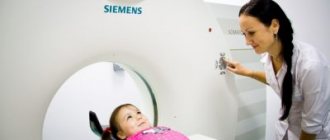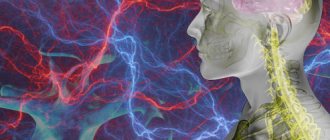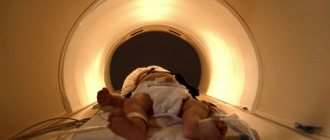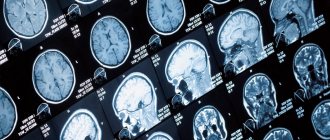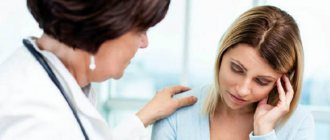Heart rhythm disturbances at night are associated with neurosis, disruption of the autonomic nervous system, apnea syndrome (breathing cessation), increased blood pressure, and diseases of the digestive system. Arrhythmia at night can be in the form of bradycardia, conduction block, extrasystole, paroxysmal tachycardia. Treatment requires searching for and correcting the underlying pathology and taking medications.
Why does heart palpitation occur?
The first reason is tachycardia, when pulsation is felt not only in the heart, but also in the neck, head and fingers and toes. In a state of tachycardia, the pulse is higher than 90 beats per minute. With normal functioning of the heart muscle, the heartbeat should not be felt.
The second reason for a rapid heartbeat is a condition caused by colds, elevated body temperature, and emotional overload. Such attacks, when the heart beats quickly, occur in healthy people and do not carry pathological changes in the cardiac organ.
What is nocturnal tachycardia
Nocturnal tachycardia is an increase in heart rate of more than 90 beats per minute during sleep. If it occurs due to insomnia or excessive consumption of coffee in the evening, then it is a variant of the norm.
If tachycardia bothers you regularly without obvious provoking factors, then this may be a symptom of some pathological processes in the body.
What is tachycardia?
The human heart beats at a frequency of 60-90 beats per minute. A condition in which the heartbeat reaches 90 beats or higher is called “tachycardia” in medicine. It can be physiological, or it can be pathological - a symptom of various diseases. Physiological tachycardia is a variant of the norm, does not cause significant discomfort to the patient, occurs in completely healthy people, and goes away after a short rest.
Emotional experiences
It can be observed during significant physical exertion, in stressful situations, during fear, emotional experiences, both positive and negative, after drinking coffee and caffeine-containing drinks. This physiological increase in heart rate can also occur at night. If before going to bed a person, for example, watched a horror movie, decided to do physical exercise, drank a couple of cups of coffee, if the day was emotionally intense, there were stresses at work. All these factors do not go unnoticed and can cause increased heart rate at night.
If such a condition occurs once and is associated with any of the above reasons, after rest the person feels well, this condition is regarded as a variant of the norm, and there is no reason for concern. Perhaps an attack of rapid heartbeat occurred due to overstrain of the body and nervous system. But if such attacks occur regularly at night, then they are pathological and dangerous to health. And it is imperative to find out the reason for their occurrence.
Causes of tachycardia
During sleep, the entire body restores its functioning. He is in a relaxed state and gaining strength. Tachycardia at night is a dangerous syndrome in which the heart works at an increased rate with incomplete filling of the ventricles with blood. An attack of tachycardia at night can be either temporary or repeated at intervals. The reasons why your heart rate increases at night can be of different nature. Tachycardia is a symptom of the disease, not a deviation. Arises as a result:
- suffered severe stressful situations;
- problems with the heart and blood vessels;
- obesity;
- pathologies of the endocrine system;
- problems with the thyroid gland;
- gastrointestinal deviations;
- malfunction of the central nervous system;
- presence of asthma;
- rheumatism;
- hypoxia;
- pneumothorax;
- pulmonary obstruction;
- thyrotoxicosis;
- allergies.
Causes
Rapid heartbeat at night indicates one or a combination of several factors:
- Decreased activity of neurons in the reticular formation of the trunk, as well as pathological changes in the internal region of the Varolius pons. Normally, during the paradoxical sleep phase, these areas of the brain suppress the sympathetic nervous system. This explains the huge number of morning heart attacks and strokes.
- Decrease in vagal tone. Normally, at night, its autonomic fibers reduce the heart rate (HR) and reduce blood pressure (BP), acting on the sinoatrial Kis-Flac node of the cardiac conduction system.
- Strong positive or negative emotional shock, leading to overexcitation of the cerebral cortex.
- Chronic stress. Neuroses.
- Arterial hypertension and:
- insufficient dosage of the drug for tachycardia and/or blood pressure;
- “rebound” in blood pressure and heart rate due to abrupt withdrawal of medication against hypertension and/or tachycardia;
- poorly calculated drug dose compensation for blood pressure and heart rate when forced to take medications that inevitably cause their increase;
- incorrect (morning or afternoon) regimen of taking antihypertensive medication, which at the same time reduces the pulse, for example, bisoprolol tablets.
- Osteochondrosis of the cervical spine.
- Age-related changes in hormonal levels during puberty and menopause.
- Diseases of the endocrine glands. Diabetes.
- Organic myocardial lesions.
- Any type of anemia.
- Heat.
- The debut of acute intoxication, including alcohol poisoning.
- Physical and emotional stress. Sedentary lifestyle. Staying in one position for a long time the night before.
At night, a strong heartbeat can be a consequence of oxygen deprivation due to involuntary holding of breath (apnea) and night snoring.
On a note. Involuntary obstructive breath-holding during sleep and chronic snoring can not only increase heart rate, but are also causes of arrhythmias and cardiac rhythm conduction disturbances.
By the way, both apnea and snoring, in addition, cause an imbalance in the phases of rapid and paradoxical sleep, which can also cause attacks of nocturnal tachycardia.
The main types of heart rhythm and conduction disturbances in apnea and snoring
Increased heartbeat at night also bothers pregnant women. This is inevitable, since pregnancy itself causes natural physiological changes that lead to an increase in heart rate and/or an increase in cardiac output.
Causes:
- changes in hormonal levels;
- an increase in blood volume, which increases the load on the myocardium;
- growth of the uterus, increasing pressure in the abdominal cavity.
As soon as the expectant mother wakes up at night with her heart jumping out of her chest, she should go to her antenatal clinic doctor and inform him about the appearance of this manifestation.
Other causes of nighttime palpitations
Strong heart palpitations at night are caused by the following reasons:
- Organic myocardial lesions (cardiomyopathy), diseases of the endocrine system (thyrotoxicosis, diabetes mellitus). The patient is aware of the diseases, and treatment is aimed at combating the underlying pathology.
- Intoxication with alcohol, nicotine, acute infections, uncontrolled use of cardiac medications (self-medication).
- Anemia.
Sometimes the doctor cannot reliably determine the cause of nocturnal tachycardia. Such cases are considered idiopathic.
Main reasons
A rapid heart rate, goosebumps, severe weakness, trembling and other symptoms frighten people. This may be either a secondary contraction of the myocardium or a harbinger of heart disease. The main reasons for the appearance of this condition include:
- Disorders of the gastrointestinal tract
. Poisoning, poor diet, excess consumption of fatty, fried foods. - Dehydration
. Lack of fluid due to stress, severe fatigue, prolonged exposure to the sun. - Endocrine system diseases
. Weak hormone production can cause rapid heartbeat and trembling. - Alcohol poisoning
. Often, a hangover syndrome is accompanied by tachycardia and trembling in the body. - Temperature surges
. Various diseases from acute respiratory viral infections to internal inflammatory processes can be accompanied by rapid heartbeat.
The symptoms correspond to a number of mental disorders. Severe trembling, sweating, dry mouth, and tachycardia are experienced by people who have been in a stressful, depressive state for a long time. Mild panic attacks are characterized by similar manifestations. Chills are the main symptom of impaired thermoregulation in the body, so the cause may be a virus or hidden inflammation.
Testing for antibodies to coronavirus allows you to determine whether a person is sick or has already suffered from pathology. And quantitative research data in numbers helps to assess the quality of the formed immunity, identify the stage and severity of the inflammatory process in the bronchopulmonary system. Read more in the article: “test for antibodies to coronavirus: numbers and explanation.”
In the morning or immediately after sleep
Advertising:
Rapid heartbeat can occur against the background of emotional excitement or after physical activity. But a high heart rate immediately after sleep is more often caused by activation of the vagus nerve. When a person sleeps, his activity decreases and vascular resistance decreases.
The body relaxes and reacts less strongly to external stimuli. With a sudden awakening, baroreceptors are not able to activate instantly.
The body has not had time to adapt to awakening, which causes trembling and palpitations.
The cause may be a sudden rise, sudden awakening, or lack of sleep. Incorrect pillows or mattresses can trigger symptoms. Often, immediately after sleep, tachycardia occurs in those who experience severe physical or mental stress. This means that the allocated sleep time was not enough for the body to rest. There is no need to consult a doctor with such manifestations; it is enough to adjust the regimen.
Anticoagulants are medications that thin the blood and prevent the formation of blood clots. They are prescribed in the complex treatment of coronavirus, as they effectively restore normal blood circulation and prevent the development of dangerous consequences of COVID-19. Read more in the article: “blood thinners for coronavirus.”
Night attacks
In normal mode, during sleep, a person’s pulse first normalizes, then becomes less frequent. But if the slowdown does not occur, then tachycardia may begin, which is accompanied by severe trembling and excitement. Often the reasons are:
Advertising:
- excessive alcohol consumption, smoking;
- watching a horror movie;
- neurotic state, stress;
- excessive consumption of strong tea, coffee, wine.
Circadian rhythm disturbances may also be the cause. If a person watches something on a computer, TV, mobile phone screen or reads before going to bed, then the circadian rhythm is disrupted. It is more difficult for him to fall asleep, his heartbeat quickens, and various disruptions occur. You should consult a doctor only if you experience dry mouth, chest pain, or obesity. Such symptoms often indicate rhythm disturbances, blocks with pauses, and atrial fibrillation. It is forbidden to take medicine before the examination, if the cause is cardiovascular system disorders, then an incorrectly selected drug can cause complications.
Increased heart rate at rest
A constantly increased heart rate at rest or repeated attacks is a reason to consult a specialist. This symptom may be a symptom:
- poisoning of the body;
- diseases of the cardiovascular system;
- diseases of the endocrine system.
It occurs more often in people who spend most of the day sitting or lying down and exhibit minimal physical activity during the day. Physical lack of training provokes both an increased pulse and trembling in the body. If symptoms are accompanied by fever, immediate hospitalization is necessary.
A rapid resting pulse often becomes a harbinger of heart disease, acute and chronic failure.
Appears both indoors and outdoors. It often occurs when a person suddenly gets up from a chair or bed. Self-help methods include the introduction of regular exercises, gymnastics, changing the introduction of up to 2 liters of water into the diet. It is useful to review your eating habits, add more green vegetables and fresh fruits. For most people, these techniques will help avoid an attack.
Symptoms
Since nocturnal attacks of tachycardia are accompanied by a panic attack, after sleep a person can explain them as disturbing dreams and not attach any significance.
This approach to assessing health status is justified only when attacks are isolated. If night palpitations constantly cause sleep disturbances, after waking up the rhythm does not normalize, shortness of breath appears, and subjectively tachycardia is felt as an attempt by the heart to jump out of the chest, then a trip to the doctor cannot be postponed.
Characteristic signs that tachycardia during sleep is serious and it is necessary to sound the alarm are pain and a feeling of tightness in the chest, dizziness, and fainting.
Symptoms of seizures during sleep
Changes in heart rate cause patients to feel palpitations, anxiety or sudden panic, discomfort or pain in the heart area, and difficulty breathing. Sudden awakenings and nightmares may be signs of heart rhythm problems. When extrasystole occurs, there may be tremors in the chest or “turning over” of the heart.
In the morning, patients experience typical manifestations of poor sleep quality:
- severe weakness, weakness;
- dizziness when getting out of bed;
- irritability;
- memory impairment;
- difficulty doing work that requires concentration.
These signs may be accompanied by pale skin, coldness of the extremities, blurred vision in the form of flashing dots before the eyes, and fainting due to ineffective cardiac output with serious heart rhythm disturbances.
- Drugs for rapid heartbeat: effective remedies for tachycardia
Attacks of palpitations
If a person experiences attacks of rapid and strong heartbeat, then he should fix his attention on the following manifestations of tachycardia:
- the frequency of occurrence of such a condition;
- duration of the attack;
- the cause of tachycardia (stress, food, physical activity, no apparent reason);
- typical time of onset of attacks (time of day);
- associated symptoms;
- pulse rate and rhythm;
blood pressure readings during an attack.
Diagnostics
The following methods are used in diagnosis:
- ECG. It may not be informative in case of paroxysmal arrhythmia, which bothers the patient only at night and not during the daytime.
- ECG Holter monitoring - electrodes are fixed to the human body and an ECG is recorded all day long, even during sleep. After recording, the data is output to a computer and decrypted by specialists.
- Transesophageal electrophysiological study. This is a study of the conduction system of the heart using electrodes that are inserted through the esophagus.
- EchoCG is a method that allows you to visualize the chambers of the heart, valves, great vessels, and the condition of the heart muscle.
Also, to find out the causes of tachycardia, the following are used: ultrasound of the thyroid gland, general, biochemical blood tests, MHO analysis, determination of blood glucose levels.
How is tachycardia detected?
The main diagnostic method is an electrocardiogram.
If there are frequent attacks, you should consult a doctor, who will prescribe an ECG. Stress tests are also used to identify failures in the cardiovascular system.
Since heart pathologies are often caused by dysfunction of the autonomic nervous system, the patient is questioned in detail for the presence of additional symptoms and, to obtain more detailed information about his condition, the following is carried out:
- Echocardiography to assess the condition of the valve apparatus and the presence of functional changes in the organ.
- Electrophysiological study necessary to study the electrophysiological properties of the conduction system and cardiac sections.
- Coronary angiography to determine coronary artery disease, the degree of narrowing of the coronary artery and the location of the narrowing.
WE RECOMMEND: Features of pirouette-type arrhythmia
If the development of tachycardia is caused by pathologies of other organs, then consultation with highly specialized specialists will be required.
Diseases that cause palpitations and first aid
In addition to people suffering from hypertension and hypotension, heart rhythm problems can be detected in a person with normal blood pressure. What do such manifestations indicate? This may be due to diseases:
- pathological disturbances in the functioning of the heart;
- heart disease;
- myocardial dystrophy (heart damage);
- disruption of the endocrine system;
- arrhythmia (impaired heart contraction);
- anemia (iron deficiency);
- disorders of the nervous system;
- hypoxia.
Having discovered symptoms that a strong heartbeat has suddenly appeared, a number of measures should be taken to alleviate the condition.
- Provide fresh air access to the room.
- If there is a scarf or collar around your neck, remove it immediately.
- Wipe your face and neck with a cold wet towel.
- Sit on the bed in a lying position.
- If the symptom does not occur for the first time, it is permissible to take medications prescribed by a doctor.
How to quickly stop an attack?
If a person experiences a strong heartbeat, trembling inside and does not know what to do, then there is a risk of aggravating the situation. In a panic, people often start taking medications and looking for a phone number to call a specialist. But if rapid pulse and trembling are not caused by serious pathologies, then they can be stopped in three ways:
Advertising:
- Submerge your face in cold water
. An effective method that will quickly relieve an unwanted condition. You can also wipe your face with a cold, wet towel. - Valsalva maneuver
. Inhale, pinch your nose with two fingers and close your eyes. Tighten your abdominal muscles and try to exhale in this state. - Drink a glass of cold water
. Drink from 150 to 400 ml of cold water in small sips. Additionally, you can apply something cold to your head.
Simple recommendations will help you get rid of palpitations quickly. If the methods do not help, then the symptoms are provoked by a serious pathology, and you cannot do without the help of a specialist.
Medicines
In many home medicine cabinets you can find drugs to reduce heart rate. They are available without a doctor's prescription and will help you quickly restore your performance. However, before taking them, it is important to find out the cause of this symptom, since different groups of drugs have different compositions and are indicated for tachycardia of different origins. So, the doctor may recommend the following medications:
- Valocordin, Corvalol - drugs based on phenobarbital and plant extracts, available in the form of drops that need to be diluted in water;
- valerian officinalis - comes in the form of drops and tablets, it helps well with tachycardia caused by nervous tension;
- rosehip or hawthorn fruits, motherwort root - raw materials for the preparation of soothing decoctions, useful for calming the heartbeat;
- if necessary, medications to replenish potassium or magnesium deficiency (Asparkam, Panangin).
There are contraindications, you need to consult a specialist!
Related posts:
- Left side hurts Pain is a complex process, the occurrence of which is not fully understood. She…
- Not enough oxygen - why and what can help Hypoxia (literal translation from Greek - “little oxygen”) is a condition...
- My head is spinning, how to deal with the problem of VSD When the world “floats”, it becomes uncomfortable and frightening: you have to not...
- Neuralgia: causes, symptoms Neuralgia is damage to the peripheral nerves, accompanied by intense pain in…
